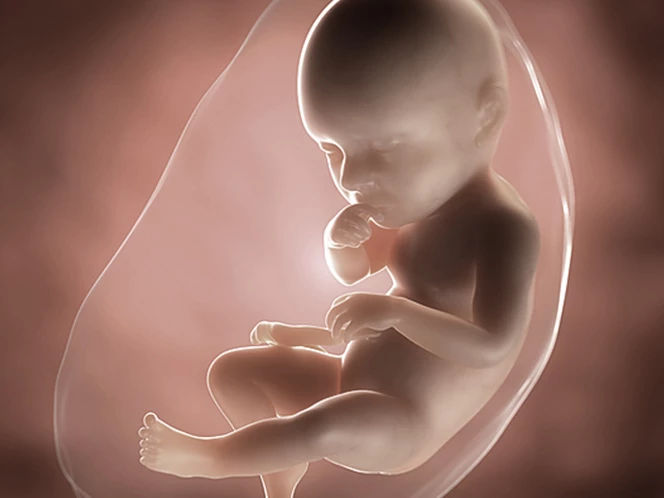39 weeks pregnant

Explore pregnancy stages week by week
Liquid gold
By the time you're 39 weeks pregnant, your baby is probably in the head-down position, ready for birth. It won’t be long until you’re meeting them face-to-face and beginning your breastfeeding journey together. Learn why breast milk is the best source of nourishment for your baby and how to support both your own health and your baby’s development with a healthy, well-balanced breastfeeding diet.
 Your baby's development at 39 weeks
Your baby's development at 39 weeks
Preparations for life outside the womb in week 39
With only a week or so to go until your due date, your baby is now roughly 36cm long from head to bottom and weighs around 7lbs1. There is a wide variation in sizes and weights though, and this is just an average figure. The umbilical cord, which connects your baby to the life-sustaining placenta, has grown in length too, and now measures around 51cm1.
Your baby’s body parts are now all in place and, interestingly, at birth your baby will have more bones than you do. Newborns have a total of 300 bones and as they grow, some of these will fuse together so that by the time they are an adult, they will have just 2061.
A more noticeable aspect of your baby’s body at birth is the potential swollen appearance of their breasts (if a girl) and the genitals, particularly of baby boys. This is caused by pregnancy hormones and any swelling should disappear soon after birth1.
Your baby’s brain continues to develop rapidly at this stage, and just as their body does, it will continue to develop and grow into childhood and beyond2.
Babies are born with 300 bones, some of which will naturally fuse together as they grow.
Breastmilk: Complex support for your baby’s development
Although much of your focus at the moment may be on birth and meeting your baby, it won’t be long until you need to turn your attention to breastfeeding.
Your breastmilk is unique to you and your baby. It’s designed to support them from day one with a balanced combination of the nourishment they need including: carbohydrates, proteins, fats including LCPs (long chain polyunsaturated fats), nucleotides, prebiotics, vitamins, minerals and antibodies.
This complex substance will adapt to your baby’s needs as they grow, contributing to their ongoing development.
Your breast milk is the best source of nourishment for your baby, perfectly matching their individual needs.
Looking ahead to your breastfeeding diet
A healthy, well-balanced diet while breastfeeding supports both you and your baby. Eating a variety of fresh, nutritious, minimally-processed foods from all the main food groups will help to maintain a strong milk supply that delivers the wide range of nutrients your baby needs for optimal development.
When breastfeeding, aim to include the following as part of your healthy breastfeeding diet3:
- A variety of at least five portions of fruit and vegetables each day
- Plenty of starchy foods like bread, pasta, rice and potatoes (choosing wholegrain varieties when possible)
- Protein from lean meat, poultry, fish, eggs, beans, pulses and nuts
- At least two portions of fish a week, including a portion of oily fish
- Dairy foods such as milk, cheese and yogurt, choosing reduced fat varieties when possible
Among its many advantages, breast milk carries flavours from your diet, which may encourage an acceptance of a variety of foods by babies when they are weaned onto solids4. So, if you eat a healthy, well-balanced diet, it’s likely that your baby will too5.
Next Steps
Add the following foods to your shopping list for quick snacks that are ideal for the last weeks of pregnancy and the early days of breastfeeding:
- Sunflower and pumpkin seeds
- Wholemeal pitta breads
- Fortified wholegrain breakfast cereal
- Yogurt and yogurt drinks
- Dried fruit, such as apricots, figs and prunes
- Snacking portions of your favourite vegetables e.g. carrots, cucumber, cherry tomatoes
related articles
Read More

Need some help?
You can get quick answers to common questions in our FAQs.
Alternatively, if you need help with general pregnancy or baby advice, or maybe on using or ordering our products - our expert team are always on hand to talk about feeding your baby.
- Deans A. Your New Pregnancy Bible, The experts’ guide to pregnancy and earlyparenthood. 4th ed. London: Carroll & Brown Publishers Limited, 2013. p.50.
- Murkoff H, Mazel S. What to Expect When You’re Expecting. 4th ed. London: Simon & Schuster Ltd, 2009. p. 337.
- Gandy J (Ed). Manual of Dietetic Practice, 5th Edition. Wiley Blackwell. UK. 2014 pp.237-238.
- Cooke L, Fildes A. The impact of flavour exposure in utero and during milk feeding on food acceptance at weaning and beyond. Appetite 2011;57(3): 808- 114.
- Robinson S, Marriott L, Poole J, et al. Dietary patterns in infancy: the importance of maternal and family influences on feeding practice. The British journal of nutrition 2007;98(5): 1029-37.
Last reviewed: 11th June 2019
Reviewed by Nutricia’s Medical and Scientific Affairs Team





